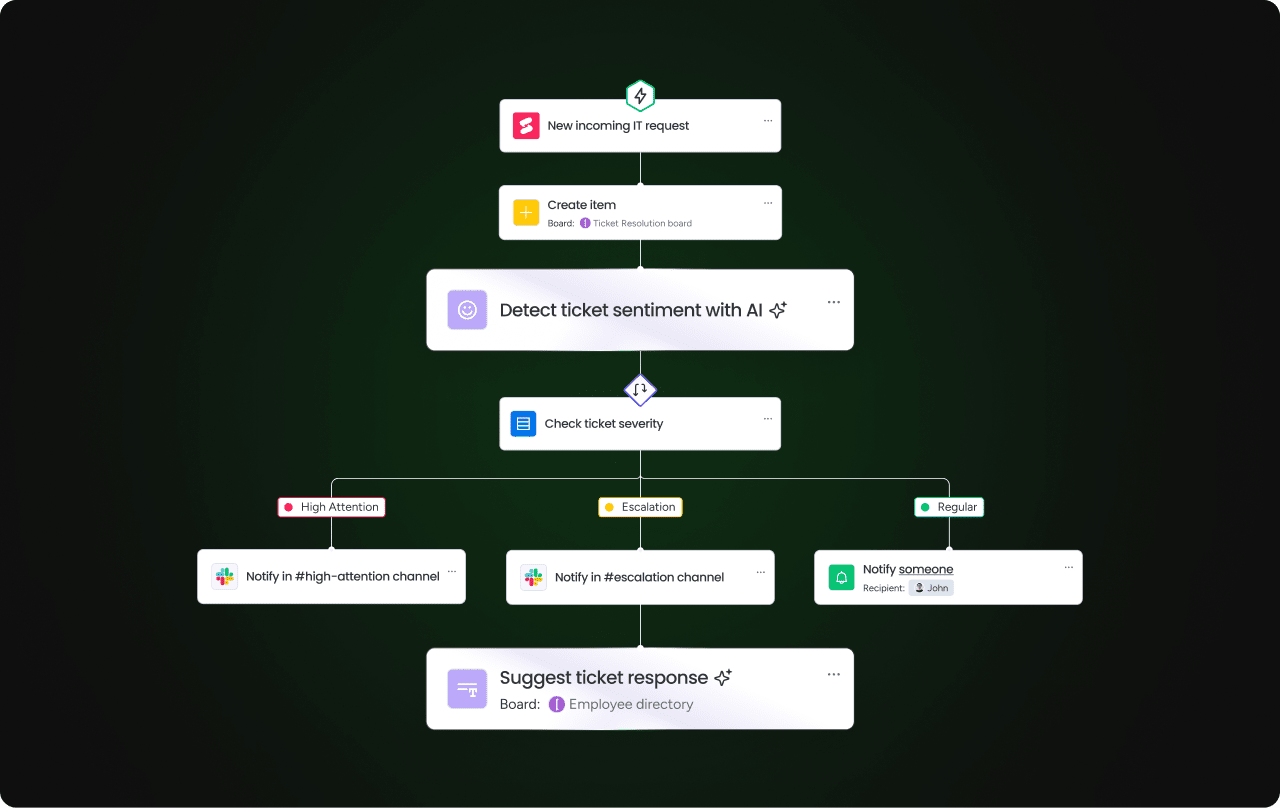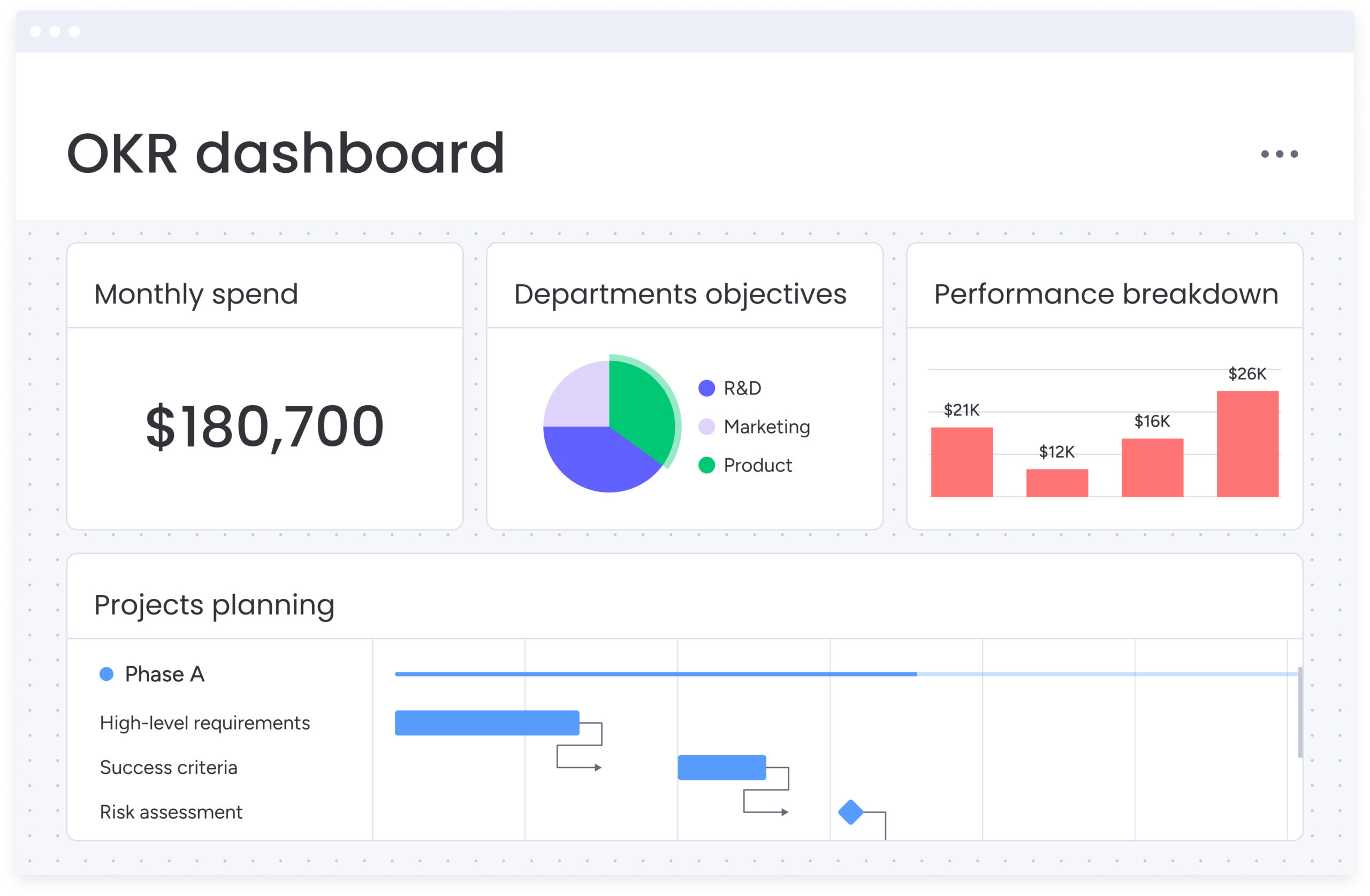Most small business leaders are masters of juggling roles — acting as the strategist, project lead, and financial planner all in the same day. While this business agility is a strength, it often leads to scattered work, with crucial information living in separate spreadsheets, email threads, and disconnected apps. This separation makes it nearly impossible to connect day-to-day execution with the company’s strategic goals.
To move from constant scrambling to smooth execution, small business management needs a focused, organized approach. Instead of scattered tools, bring everything into one system where your goals, resources, and progress are clear and connected. This gives your team the direction and confidence to grow, making financial oversight and strategic planning much simpler.
With a flexible platform like monday work management, you can unify strategy, execution, and oversight in one place, eliminating scattered processes and empowering both leaders and teams with real-time clarity. In this guide, we’ll cover the core principles of effective small business management, the most in-demand skills for 2025, actionable strategies for daily operations, technology considerations, and proven methods for sustainable growth.
What is small business management?
Small business management is the coordination and oversight of all business operations, processes, and resources to achieve organizational goals efficiently. It encompasses planning, organizing, leading, and controlling various business functions including finance, operations, human resources, and strategic planning.
The core components work together to create sustainable business success. Strategic planning sets long-term goals and determines how to achieve them, while operations management oversees daily business activities and workflows. Financial oversight manages budgets, cash flow, and financial reporting, and team leadership handles hiring, training, and managing employees.
Resource allocation distributes time, money, and materials effectively across all business functions. monday work management helps centralize these management functions in one digital workspace, providing foundational understanding for business leaders ready to elevate their operations.

Why effective small business management matters
Effective small business management directly impacts revenue protection, growth potential, and competitive advantage in the marketplace. Proper management protects your bottom line and prepares your business for future expansion opportunities — especially critical when 18% of small businesses fail within their first year.
What happens when management systems lack structure? Organizations experience lost sales opportunities, operational inefficiencies, and increased vulnerability during economic downturns. Strong management practices create several critical outcomes that drive business sustainability.
The benefits of structured small business and management approaches include revenue protection through enhanced forecasting and resource planning. Scalability preparation ensures systems can handle increased demand, while risk mitigation prevents costly compliance issues and operational mistakes. Team retention improves through consistent management practices, reducing hiring and training costs.
Companies with robust management systems pivot quickly during market changes and capitalize on emerging opportunities ahead of competitors. monday work management supports these outcomes through automated reporting, resource tracking, and cross-departmental collaboration capabilities.
Try monday work managementKey skills and roles in business management
Every small business manager needs specific competencies to navigate modern business operations successfully. These skills span technical capabilities, interpersonal effectiveness, and strategic thinking to ensure comprehensive business oversight.
Essential management skills fall into categories that directly impact business performance. Communication skills enable effective team leadership through clear meeting facilitation, constructive feedback delivery, and collaborative problem-solving. Financial literacy supports informed decision-making through budget analysis, cash flow monitoring, and profit-loss evaluation.
The most critical competencies for business management small business leaders are:
- Strategic planning: Setting quarterly goals, annual budgets, and long-term growth targets
- Operations oversight: Managing daily workflows, quality control, and customer service standards
- Team development: Conducting performance reviews, providing skills training, and succession planning
- Financial management: Monitoring cash flow, controlling expenses, and analyzing profitability metrics
- Technology integration: Implementing business platforms, automating workflows, and data analysis
Technology adoption has become increasingly critical as businesses digitize operations and automate routine processes. Decision-making capabilities require data analysis skills, option evaluation techniques, and the confidence to make timely choices under uncertainty.
monday work management enhances skill development through intuitive dashboards for data-driven decisions, automation recipes for effective delegation, and collaboration features that improve communication across teams.
7 strategies for day-to-day operations
Implementing proven operational strategies addresses the most common challenges small businesses face while building sustainable growth foundations. These approaches focus on practical solutions that deliver immediate improvements and long-term organizational benefits.
1. Clarify goals and milestones
Set SMART goals that cascade from company-level objectives to individual team member responsibilities. Break large objectives into measurable milestones with specific deadlines and success criteria. Use visual project tracking to maintain alignment and momentum across all business functions.
2. Streamline financial oversight
Monitor cash flow weekly, track expenses against budgets, and review financial performance monthly. Establish consistent reporting rhythms and identify key performance indicators that signal business health.
3. Adopt automation and AI
Start with automating repetitive administrative tasks like data entry, invoice generation, and appointment scheduling — especially since 33% of small businesses still view AI as just a trend. Use AI capabilities for data analysis, task assignment optimization, and workflow recommendations.
monday work management’s AI Blocks offer accessible automation that categorizes data, extracts information from documents, and suggests action items without requiring technical expertise.

4. Train and retain team members
Develop structured onboarding processes, ongoing skills training programs, and clear performance management systems — evidence shows that a 10% boost in training can yield a 3% productivity increase within two years. Create advancement opportunities and recognition programs that reduce turnover costs while improving team stability and productivity.
5. Track progress with dashboards
Leverage real-time dashboards to monitor business performance across all key metrics. Present data visually to enable proactive decision-making rather than reactive problem-solving.

6. Foster a culture of collaboration
Implement consistent communication practices, regular team meetings, and cross-functional project workflows. Break down departmental silos and encourage knowledge sharing through collaborative platforms and shared accountability systems.
7. Manage resources and workflows
Allocate human resources based on skills and availability while planning capacity for peak demand periods. Identify process bottlenecks and redistribute workloads to optimize efficiency and support sustainable business growth.
Try monday work managementChoosing the right platforms and systems
Selecting appropriate business management platforms significantly impacts operational efficiency, team productivity, and scalability potential. The right platform centralizes critical functions while adapting to evolving business needs and growth requirements.
Key evaluation criteria should guide platform selection decisions to ensure long-term value and user adoption. Scalability determines whether the platform can grow with expanding operations and increased complexity. Ease of use affects team adoption speed and ongoing productivity levels.
Integration capabilities ensure the platform connects seamlessly with existing systems and third-party applications. Customization options allow businesses to adapt workflows to specific industry requirements and operational preferences.
What happens when your current systems can’t handle increased transaction volume or team size? monday work management stands out for organizations needing sophisticated workflow customization and AI-powered automation.
The platform offers project portfolio management, advanced automation recipes, and comprehensive dashboard creation capabilities that scale with business complexity. These features support growing organizations without requiring extensive technical expertise.

Long-term growth and planning
Strategic planning extends beyond daily operations to focus on sustainable expansion, market positioning, and organizational development. Successful small businesses balance immediate operational needs with long-term strategic investments that support scalable growth.
Critical planning elements require systematic attention to ensure business sustainability and competitive advantage. Market expansion involves evaluating new customer segments, geographic territories, and product opportunities before committing significant resources.
Operational scaling prepares systems and processes to handle increased volume without compromising quality or efficiency. Team development builds leadership capabilities throughout the organization while creating scalable management structures.
The essential components of long-term planning include:
- Market expansion: Evaluating new markets and customer segments before investing resources
- Operational scaling: Preparing systems and processes to handle increased volume and complexity
- Team development: Building leadership capabilities and developing scalable organizational structure
- Technology roadmap: Planning for future platform needs and integrations as business grows
- Financial planning: Assessing capital requirements and funding strategies to support growth
Consider whether or now your current management systems prepared to support your next growth phase. monday work management supports long-term planning through portfolio management features, resource allocation capabilities, and scalable workflow automation that grows with your business.
Strategic businesses also invest in competitive intelligence, customer feedback systems, and market trend analysis to anticipate industry changes. This proactive approach enables faster adaptation to market shifts and positions companies to capitalize on emerging opportunities.
Try monday work managementStepping forward with next-level management
Effective small business management combines strategic thinking with practical execution to create sustainable competitive advantages. The integration of proven management strategies, appropriate technology platforms, and continuous improvement processes transforms operational capabilities and accelerates business growth.
Success requires commitment to systematic approaches rather than reactive management styles. How will you measure the effectiveness of your management improvements? The most successful businesses establish clear metrics, regular review processes, and adjustment mechanisms that ensure continuous optimization.
monday work management brings together all the capabilities discussed throughout this guide — from AI-powered automation and customizable workflows to real-time dashboards and collaborative project management. The platform democratizes advanced management capabilities, making sophisticated business intelligence accessible to growing organizations.
Take the next step toward transforming your business operations by centralizing your management processes on a platform designed to scale with your strategic vision and operational complexity.
FAQs about small business management
What are the 4 main functions of small business management?
The four main functions of small business management are planning (setting goals and strategies), organizing (structuring resources and workflows), leading (motivating and directing team members), and controlling (monitoring performance and making adjustments to achieve objectives).
What makes small businesses successful in their management approach?
Small businesses become successful through clear goal-setting, effective team communication, consistent financial oversight, and the ability to adapt quickly to market changes while maintaining operational efficiency and customer satisfaction.
How do small business owners manage daily operations most effectively?
Small business owners manage daily operations effectively by establishing clear workflows, using management platforms to track progress, delegating responsibilities appropriately, and maintaining regular communication with their teams through structured meetings and reporting systems.
What management skills do small business owners need to develop first?
Small business owners need strong communication skills for team leadership, financial literacy for budget management, decision-making abilities for strategic choices, technology skills for implementing business platforms, and delegation capabilities for scaling operations.
How can small businesses prepare their management systems for growth?
Small businesses prepare for growth by implementing scalable systems and processes, developing team leadership capabilities, establishing clear performance metrics, and choosing technology platforms that can expand with their operations and increased complexity.
What role does technology play in modern small business management?
Technology plays a crucial role in small business management by automating repetitive tasks, providing real-time visibility into business performance, facilitating team collaboration, and enabling data-driven decision-making through dashboards and analytics capabilities.

